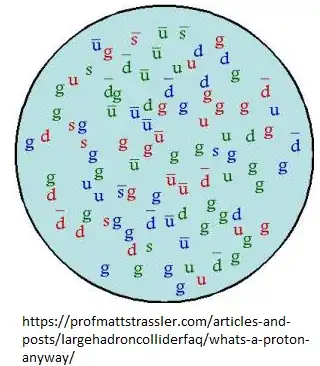I know that in a beta decay a neutron turns into a proton and a $W$-boson. I know that a $W$-boson is very heavy, so I intuitively expect the proton to by much lighter than neutron — I would expect that mass of neutron is a sum of masses of proton and $W$-boson. I know that in fact mass does not have to be conserved here, only energy, but I still don't understand something here: so the proton has lower energy than the neutron? Why, how, what type of energy?
2 Answers
I know that in a beta decay a neutron turns into a proton and a W-boson.
The mistake is in the last words "and a W-Boson". The correct statement is "a virtual W-boson".
I know that a W-boson is very heavy,
The on mass shell W boson , yes, has a large invariant mass. A four vector describing it has this invariant mass as its length.
Maybe this answer of mine may help also.
so I intuitively expect the proton to by much lighter than neutron — I would expect that mass of neutron is a sum of masses of proton and W-boson.
No, this is wrong intuition. A proton and a neutron are very complicated because of the strong interaction. See this illustration of the proton to get an intuition.
The sum of the four vectors of all those virtual particles add up to the mass pf the proton ( neutron) it is very complicated and needs QCD on the lattice for calculations. For elucidation on virtual see this answer of mine and links.
I know that in fact mass does not have to be conserved here, only energy, but I still don't understand something here: so the proton has lower energy than the neutron? Why, how, what type of energy?
The proton has lower invariant mass than the neutron, an experimental fact , and our mathematical theories are built up so as to model experimental facts and be predictive of new ones.
- 236,935
In beta decay, a neutron, composed of two down quarks and an up quark, decays to a proton composed of a down quark and two up quarks. In the process an antineutrino and an electron are emitted.
The W boson is the mediator for the transformation of a down quark into an up quark. Its mass/energy is borrowed from the vacuum (i.e., it is virtual), and its large mass means it has extremely short range because it exists only for an extremely short time before it repays the loan and exits the scene.
- 99,024
